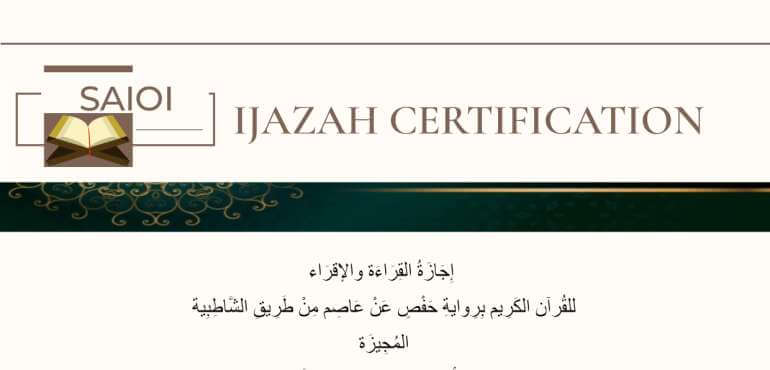
! Note: You can take Free Trial Lesson for this course with no obligations.
Online Ijazah Course
Receiving and listening to the words of the master sheikhs is the best and only way to master the recitation of the Book of Allah Almighty by obtaining a Ijazah.
What are the successes of this course?
--Obtaining an Ijazah from these Ijazahs means that the reader has connected his chain of transmission to the Prophet Muhammad and has become part of the chain of transmitters of the Qur’an with a continuous chain of transmission; such as an Ijazah with the narration of Hafs from Asim, an Ijazah in the seven readings through Al-Shatibiyyah, and an Ijazah in the three readings that complete the ten through Al-Durrah Al-Mudhiyyah, and the ten readings through Al-Shatibiyyah and Al-Durrah are called the minor ten, and also an Ijazah in the major ten readings through Tayyibat Al-Nashr.
--The ability to memorize the Holy Qur’an with perfect memorization, and study a text in Tajweed, or a book such as Ibn Al-Jazari’s system (Introduction to what the Qur’an reader should know), and understand the text and study it thoroughly.
--Laying a brick in the edifice of reciting and teaching the Holy Qur’an is the beginning of the completion and perfection of that edifice.
--Refer to some books on the principles of recitation, Quranic recitations, Tajweed, and biographies of reciters, and refer to some books of linguistic dictionaries when mentioning a definition or explanation of a strange word.
--Fiqh in religion includes all types of fiqh in religion from knowledge of the principles of religion, i.e. monotheism, interpretation, Quranic sciences, hadith, fiqh and its principles, and others.
--Understanding from Allah what is imposed upon him and being taught what He addressed him with, so he benefits from what he reads and acts upon what he recites, and learning the abrogating and abrogated, so he knows what is imposed upon him and what is not imposed upon him, and what is dropped from what is obligatory to act upon, and learning the obligatory duties and rulings; how ugly it is for a bearer of the Quran to recite its obligatory duties and rulings by heart while he does not know what he recites, so how can he act upon what he does not understand its meaning, and how ugly it is for him to ask about the fiqh of what he recites
What do you need and that affects you when you do not study this course?
--Obtaining a license with one narration such as the narration of Hafs, Warsh or Qaloon, and memorizing the text of Al-Shatibiyyah for the seven readings and Al-Durrah for those who want the minor ten. Or memorizing Tayyibat Al-Nashr for those who want the major ten.
--Reading the entire Qur’an by heart with a licensed Sheikh, paying attention to the different aspects and their corrections, and taking care to link the differences between the readers with their evidence from the text approved for reading.
--Certificate from the licensed Sheikh for the licensed student that he has read the entire Quran by heart with Tajweed, mastery and differentiation between the similar verses, and has become qualified to recite.
vContributing - God willing - to raising the level of teaching the Holy Quran and its recitation in mosques, colleges, institutes and other places of knowledge.
--The reciter is defined as: someone who has learned the recitations by performance, and who is confident in the letter he recites and the narration he recites with, and his knowledge and acquisition of the religious and Arabic sciences. The reciter’s knowledge of the Arabic language helps him understand and contemplate the Book of God Almighty, see the meanings, direct the Qur’anic recitations, Alwaqf and Alibtidaa, and other sciences related to this art.



